| |
|
By Angela Mackintosh
 In reviewing the "bones" of an Opera, it became quite clear to me that there's a great deal of similarity between the architecture of an opera and that of a story arc. Meaning that, there are three distinct sections in an Opera that represent theme and rising drama, just as there are three traditional acts in a novel. In reviewing the "bones" of an Opera, it became quite clear to me that there's a great deal of similarity between the architecture of an opera and that of a story arc. Meaning that, there are three distinct sections in an Opera that represent theme and rising drama, just as there are three traditional acts in a novel.
 No wonder Louise Marley said, "I always joke that anyone who wants to write novels should first sing opera-there's no better preparation I can think of to write distinctive characters and develop drama!" No wonder Louise Marley said, "I always joke that anyone who wants to write novels should first sing opera-there's no better preparation I can think of to write distinctive characters and develop drama!"
 Louise Marley began her life as a singer. When she was still a child, she studied music in college, going on to sing opera and concert repertoire as an adult. One summer, on a break between musical seasons, Louise started writing, and was startled to find out that she had a certain talent for it! Louise Marley began her life as a singer. When she was still a child, she studied music in college, going on to sing opera and concert repertoire as an adult. One summer, on a break between musical seasons, Louise started writing, and was startled to find out that she had a certain talent for it!
 When she realized that people liked her fiction, she became serious about it, took classes, attended the Clarion West Writers Workshop, and published her first novel. When she realized that people liked her fiction, she became serious about it, took classes, attended the Clarion West Writers Workshop, and published her first novel.
 "That was in 1995," she says, "and my ninth book is coming out at the end of this year." And I thought, 1995? That's nearly a novel a year! But Louise doesn't consider herself prolific, as you'll see in this interview. "That was in 1995," she says, "and my ninth book is coming out at the end of this year." And I thought, 1995? That's nearly a novel a year! But Louise doesn't consider herself prolific, as you'll see in this interview.
 A career novelist, Louise has retired from singing professionally, although she does occasionally "sit in" on a concert. The small college where she used to teach music, is now where she teaches a science fiction and fantasy workshop. A career novelist, Louise has retired from singing professionally, although she does occasionally "sit in" on a concert. The small college where she used to teach music, is now where she teaches a science fiction and fantasy workshop.
 Louise says, "You can never separate the professional life from the private. My twenty-two year old son is my inspiration, my first reader, and my best critic. My husband just watches us and shakes his head." Louise says, "You can never separate the professional life from the private. My twenty-two year old son is my inspiration, my first reader, and my best critic. My husband just watches us and shakes his head."
 I had to laugh, because the experience sounded extremely familiar. I had to laugh, because the experience sounded extremely familiar.
 Louise is a mother, a wife, a Roman Catholic, an animal lover, a yogini, and an avid cook with an interest in health food and natural healing. Add all those things up and you've got an all-around artist and a great interview. Louise is a mother, a wife, a Roman Catholic, an animal lover, a yogini, and an avid cook with an interest in health food and natural healing. Add all those things up and you've got an all-around artist and a great interview.
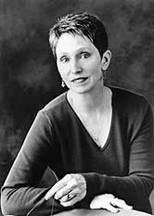 |
"Imagination is like a garden. You have to cultivate it, feed it, water it, shine light on it, and respect it!"
|
WOW: When I met you at the SF convention in Anaheim, we had a really great conversation on the publishing industry and talked about what an author can do to promote her book. I was excited to find out that you and Mary Rosenblum were "going on tour" together for your book signings! I think that shows how proactive both of you are in getting yourselves out there.
 How important do you think it is for an author to promote herself? How important do you think it is for an author to promote herself?
LM: When my first book came out, my agent let me know in very clear terms that promotion would be my responsibility. It's one of the conundrums of publishing that the big promo money goes to authors who probably don't need it-the Stephen Kings of our world. What works in promotion is the great mystery, of course.
 Because Mary and I write science fiction and fantasy, we have conventions we can go to, to meet readers, to spend time with colleagues, and to widen our audience. I do a lot of bookstore and school events, which may be only moderately helpful, but I enjoy them. Any media appearance carries a lot more weight, whether it's print or radio or (rarely) television, but of course those are hard to get, and require some sort of hook to get the attention of the media people. I also do mailings, in the guise of announcing book events, and I usually have hand-outs, bookmarks or postcards, something people can carry away in their hand to remind them of this book they mean to buy. Because Mary and I write science fiction and fantasy, we have conventions we can go to, to meet readers, to spend time with colleagues, and to widen our audience. I do a lot of bookstore and school events, which may be only moderately helpful, but I enjoy them. Any media appearance carries a lot more weight, whether it's print or radio or (rarely) television, but of course those are hard to get, and require some sort of hook to get the attention of the media people. I also do mailings, in the guise of announcing book events, and I usually have hand-outs, bookmarks or postcards, something people can carry away in their hand to remind them of this book they mean to buy.
 Today, of course, we have the internet. Both Mary and I are still trying to assess the best way to leverage an online presence. I have quite an active website, and a journal, which seems to be rather effective (view it here) because folks who visit and post also seem to order books when they appear. I'm getting a new website ready for my first pseudonymous work, and hoping that will attract attention because it will have inside information about the world of the book, Airs Beneath the Moon , and about this mysterious new author, Toby Bishop (who is really me.) I hope to do an audio download on the site, and I'll put the first chapters of the book there to entice folks to read-and buy-the rest. It helps that the cover is gorgeous. Today, of course, we have the internet. Both Mary and I are still trying to assess the best way to leverage an online presence. I have quite an active website, and a journal, which seems to be rather effective (view it here) because folks who visit and post also seem to order books when they appear. I'm getting a new website ready for my first pseudonymous work, and hoping that will attract attention because it will have inside information about the world of the book, Airs Beneath the Moon , and about this mysterious new author, Toby Bishop (who is really me.) I hope to do an audio download on the site, and I'll put the first chapters of the book there to entice folks to read-and buy-the rest. It helps that the cover is gorgeous.
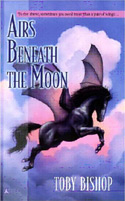 |
"At the beginning, that's all there was, this image, and our shared love of horses. It turned into the story of a world in which winged horses are considered a precious commodity, and one reserved to the nobility."
|
WOW: The cover is great!
 How closely do you work with the publicist of your publishing house? Or do you hire an outside publicist? How closely do you work with the publicist of your publishing house? Or do you hire an outside publicist?
LM: This is the first time I've hired a publicist, and I don't have much to report yet. The in-house publicists, frankly, don't do a lot, and aren't terribly responsive unless you're already a bestselling author. There's that conundrum again.
WOW: Your background is amazing-from being an opera singer to becoming a novelist. How does having a musical background influence your writing?
LM: Especially because I am a classically-trained musician, my musical life has a huge influence on my writing. A lot of it is technical: in music, you study form, as in symphonic form or song form, and of course there are major and minor themes in all classical music pieces.
 I think I've integrated that understanding of form and theme into my novels, so that I have a sort of gut instinct about where the high points of a story should be, where the climax goes, and how it all resolves. I think I've integrated that understanding of form and theme into my novels, so that I have a sort of gut instinct about where the high points of a story should be, where the climax goes, and how it all resolves.
 In opera, you study scene, and character, and you learn pacing, and staging. I always joke that anyone who wants to write novels should first sing opera-there's no better preparation I can think of to write distinctive characters and develop drama! In opera, you study scene, and character, and you learn pacing, and staging. I always joke that anyone who wants to write novels should first sing opera-there's no better preparation I can think of to write distinctive characters and develop drama!
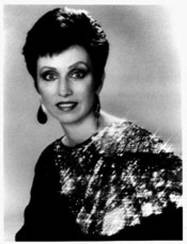 |
A picture of Louise from her singing days.
|
WOW: I bet that's true, since you are a great writer!
 Speaking of writing and music. when you sang, you had quite an audience. Now you have a writing career, with zero feedback during the writing process, how difficult is that to deal with? Speaking of writing and music. when you sang, you had quite an audience. Now you have a writing career, with zero feedback during the writing process, how difficult is that to deal with?
LM: I need a lot of feedback, as it happens. It's not true with all writers, but it is with me. I have my son, Zack Marley (watch for him!) and I also have a quite wonderful professional writers' group, the Redmond Riters, whose input is invaluable to me.
WOW: After a period of writing in solitude, how refreshing is it to go to your writers group and share your work?
LM: For me, it's huge. The critiques I get keep me sharp, and help me focus on important issues in writing. And the collegiality is a big thing-we usually spend half and hour or more just talking about the business, our lives, all the things we're concerned about. I can't imagine doing this work without that interaction.
WOW: For those of you who don't know, Louise has a very active blog. Check it out: https://journals.aol.com/lmarley/LouiseMarley
 Do you think blogging has helped with your writing? Do you think blogging has helped with your writing?
LM: I think blogging promotes a community of writers and readers. It's dangerous, though, because blogging is easy, and writing fiction is hard . . . I do know folks who start blogs, or journals, and then all their writing energy goes to the blog instead of the fiction. Of course, it's therapeutic, but it doesn't get the work done!
 It's nice, though, to sometimes have threads about the writing life, get input from other writers about how they meet challenges and difficulties. It's nice, though, to sometimes have threads about the writing life, get input from other writers about how they meet challenges and difficulties.
WOW: I agree, but what do you think about people who bash internet communities because they think it doesn't allow them to connect on a personal level?
LM: We just had this very discussion in a panel at the World Science Fiction Convention in L.A. There are those who think meeting online is a substitute for meeting in person, but I've found just the opposite. In fact, in L.A., I met a charming woman who is a regular visitor to my blog, and we had a chance to talk in person, which enhances our online friendship. I've found that the internet community means that my personal community is not only wider, but also more present on a daily basis. I have friends around the country now, and I feel I could sit down with any one of them for coffee, and it would be as if we'd always known each other, as if we saw each other every week.
WOW: You are extremely prolific. Do you have a writing routine and/or writing schedule?
LM: I'm not prolific! I wish I were. People who write two and three novels a year, those folks are prolific!
 Of course, it's all relative. To people who write a novel every five years, I probably seem to have a high output. And yes, I do indeed have a routine. I think it's important, because the work doesn't get done without some sort of plan, or schedule. Of course, it's all relative. To people who write a novel every five years, I probably seem to have a high output. And yes, I do indeed have a routine. I think it's important, because the work doesn't get done without some sort of plan, or schedule.
 When I was still teaching at Cornish, and often singing at night, I got up a bit early, and wrote for two hours before going off to the college. In some ways, that was my most productive writing period; it's often the case that when we have more time to write, we waste a good bit of it. Ah, the joys of eBay . . . When I was still teaching at Cornish, and often singing at night, I got up a bit early, and wrote for two hours before going off to the college. In some ways, that was my most productive writing period; it's often the case that when we have more time to write, we waste a good bit of it. Ah, the joys of eBay . . .
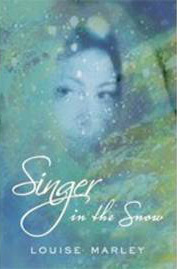 WOW: Louise, you have a new book out: Airs Beneath The Moon (written by your pseudonym, Toby Bishop) WOW: Louise, you have a new book out: Airs Beneath The Moon (written by your pseudonym, Toby Bishop)
 What made you decide to get into the YA (Young Adult) market? Or did this just come naturally with your subject matter? What made you decide to get into the YA (Young Adult) market? Or did this just come naturally with your subject matter?
LM: Airs, though it's a fantasy of women and winged horses, is not actually YA. My last book is, Singer in the Snow, but the Toby Bishop book is intended for adults. I hope it will have a YA following, though-I mean, girls and horses, right? And one of the protagonists is a teen-aged girl who flies a winged horse.
 I didn't so much intend to get into the YA market as fall into it. My first trilogy, The Singers of Nevya, was written for adults but has a strong young adult following. It was nice when Viking asked for a YA book, because I wanted to write in that world again, and so I wrote Singer in the Snow. I think my writing voice, if you will, is well-suited to YA, but I wrote what I cared about, which I always recommend, and was fortunate to find an audience for it. I didn't so much intend to get into the YA market as fall into it. My first trilogy, The Singers of Nevya, was written for adults but has a strong young adult following. It was nice when Viking asked for a YA book, because I wanted to write in that world again, and so I wrote Singer in the Snow. I think my writing voice, if you will, is well-suited to YA, but I wrote what I cared about, which I always recommend, and was fortunate to find an audience for it.
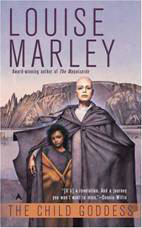 WOW: Why is it good to have a pseudonym? And how did you go about coming up with Toby Bishop? WOW: Why is it good to have a pseudonym? And how did you go about coming up with Toby Bishop?
LM: I have a reputation for writing about rather dark issues, and for writing slightly literary, feminist novels. Examples would be The Terrorists of Irustan and The Child Goddess. The winged horse books are much lighter fare, very different from anything I've done. It seemed a good idea to write them under a different name as a signal to my readers that this would be a change. Bishop is my mother's maiden name, and I chose Toby because of the alliteration, and because it's androgynous-would you believe there's still a prejudice in favor of male authors among the book-buying public? Statistics say it's true. I've come to love the name, in any case.
WOW: I think it's a great name! Could you tell our WOW! readers what Airs Beneath The Moon is about? And what inspired you to write this novel?
LM: I grew up on the Campbell Quarter Horse Ranch in Montana! I love horses, and of course I love fantasy. My editor, also a horse lover, had this image in her mind she couldn't get rid of, this picture of a winged horse, and as we talked about what I might write next, the idea was born.
 At the beginning, that's all there was, this image, and our shared love of horses. It turned into the story of a world in which winged horses are considered a precious commodity, and one reserved to the nobility. A young girl who adopts a lost horse is shocked when the horse gives birth to a winged foal . . . and off we go! At the beginning, that's all there was, this image, and our shared love of horses. It turned into the story of a world in which winged horses are considered a precious commodity, and one reserved to the nobility. A young girl who adopts a lost horse is shocked when the horse gives birth to a winged foal . . . and off we go!
 It's a tale meant to be fun, and exciting, and very, very horsey. It's a tale meant to be fun, and exciting, and very, very horsey.
WOW: That sounds like a novel that any girl or woman would love!
 But what's the difference between writing YA and adult fiction? For instance, is there a set age that the protagonist has to be or a set word count? But what's the difference between writing YA and adult fiction? For instance, is there a set age that the protagonist has to be or a set word count?
LM: The word count is less, yes. My YA contract specifies 60K words, which is about half my usual novel length. Otherwise, the age of the protagonist is the chief difference. Sharyn November, my Viking YA editor, says that anything else is okay except for gratuitous violence, or sexual situations that take place onstage. My sense is that YA, like adult fiction, embraces a broad variety of stories and styles of storytelling. My own stories, at least my YA ones, have a certain gentleness to them, I think, that works for younger readers. even my darkest novel, The Terrorists of Irustan , was chosen on the Best Books for Young Adults list by VOYA Magazine. (Singer in the Snow is an ALA nominee for Best Books, too. Great thrill for me.)
WOW: What an achievement, Louise!
 I remember telling me that you teach Science Fiction and Fantasy at Bellevue Community College. I bet it must be wonderful for you to watch your students grow as writers! I remember telling me that you teach Science Fiction and Fantasy at Bellevue Community College. I bet it must be wonderful for you to watch your students grow as writers!
 Do you think by teaching writing it has also taught you something as well? Do you think by teaching writing it has also taught you something as well?
LM: In some ways, it inspires me, because often my students are at the same stage I was about fifteen years ago, and they remind me what it's like to be brimming with ideas and energy and casting about for how to shape them. But, frankly, my last two quarters the writers have been so good, and at such a high level, that they are almost colleagues more than students. I've been a little in awe of the fact that my simple little workshop has brought this amazing group of artists together. And yes, I do learn from them, every week. Some of them are so sharp I feel like turning over my pencil, and saying, "Here. You teach it."
WOW: (laughs)
 We all need goals, ways to keep our goals in sight and you have one of the best methods I've ever heard of, involving bookstores and their shelves. Would you share your thoughts on the importance of goals, and what you did to keep focus? We all need goals, ways to keep our goals in sight and you have one of the best methods I've ever heard of, involving bookstores and their shelves. Would you share your thoughts on the importance of goals, and what you did to keep focus?
LM: Oh yes, the story about going into bookstores with my mother, and visualizing where on the shelf the Louise Marley books would be.
 Once I decided I was pretty good at writing, I was absolutely focused on publication, on having an audience. Your methods have to change, though, as your career changes. At first, all you want is to see your work in print; then, you crave critical acclaim (which feels really, really nice); and then you want good sales figures, an assurance that you get to go on doing it! Once I decided I was pretty good at writing, I was absolutely focused on publication, on having an audience. Your methods have to change, though, as your career changes. At first, all you want is to see your work in print; then, you crave critical acclaim (which feels really, really nice); and then you want good sales figures, an assurance that you get to go on doing it!
 Awards are great, a sort of added bonus, but what you really want, more than anything, is readers. I'm at that stage now, hoping to widen my readership, connect the right readers to my novels. Awards are great, a sort of added bonus, but what you really want, more than anything, is readers. I'm at that stage now, hoping to widen my readership, connect the right readers to my novels.
WOW: I think anyone reading this interview would be grateful for the read if they picked up one of your books!
 How do you work your way through the times when the ideas aren't flowing out of your fingertips? I remember you saying that you have a way to work around being stumped that involved folding clothes, etc. How do you work your way through the times when the ideas aren't flowing out of your fingertips? I remember you saying that you have a way to work around being stumped that involved folding clothes, etc.
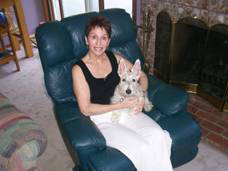
Louise & Piper |
"I don't believe in Writer's Block at all."
"Walking the dog is good, or vacuuming."
|
LM: Every writer runs into stumbling blocks. I don't believe in Writer's Block at all, but I do believe we can hit a wall, or even just dry up. For me, the best way to handle that issue is to do something physical. Folding clothes is good, because your hands are busy but your mind isn't. Driving the car with the radio off is another technique that works well for me. Walking the dog is good, or vacuuming. (You'll see a pattern here!) I'm a physically restless person, so I usually only write, as in busily typing away, for about twenty or thirty minutes at a time. Then I need to get up, move around, and do something else. My mind is still working, though. I know that, because when I sit down again, the flow resumes. I'm sure every writer has her own method for dealing with this, and it's crucial for each one to respect her own process.
WOW: In your interview with LOCUS, you said, ''Wouldn't it be nice if a fiction writer could write a book that would actually change the mind of someone who was involved?"
 If you had that power (which I do think you have, by the way) what would be your current message that you'd incorporate into your next book? If you had that power (which I do think you have, by the way) what would be your current message that you'd incorporate into your next book?
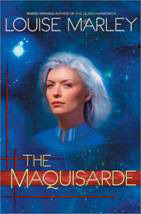 LM: Let me quote Benjamin Franklin: "There is no good war. There is no bad peace." At this point in our history, our old friend Franklin said it all. I tried, in my imperfect way, to dramatize that in my novel The Maquisarde. I'm a mother, and a pacifist, and a person of faith, and I passionately believe that what Dr. Franklin wrote is true. LM: Let me quote Benjamin Franklin: "There is no good war. There is no bad peace." At this point in our history, our old friend Franklin said it all. I tried, in my imperfect way, to dramatize that in my novel The Maquisarde. I'm a mother, and a pacifist, and a person of faith, and I passionately believe that what Dr. Franklin wrote is true.
WOW: What would you say to aspiring writers that fear they're imagination isn't what a good writer's imagination should be?
LM: Imagination is like a garden. You have to cultivate it, feed it, water it, shine light on it, and respect it! Ideas are everywhere, but they are like acorns-tiny little things that have to be nurtured so they can grow into oak trees.
WOW: Louise, is there anything else we should know about your upcoming events and/or projects?
LM: There will be three Toby Bishop novels I hope readers will look for; Airs Beneath the Moon will be out in December, and the next one will be out in the summer of 2007. After that I'm doing a YA science fiction novel titled Generation Alpha, and then a chick-lit novel called Hearts in Montana. I know it sounds like a lot, but these are projects that have been a long time in the making, and this is a slow business. I can't even give you publication dates yet!
WOW: Thank you Louise for such a wonderful and fascinating interview. You are a truly talented artist in all forms.
Check out Louise Marley's website: https://www.louisemarley.com
And her great blog that she posts in daily: https://journals.aol.com/lmarley/LouiseMarley |